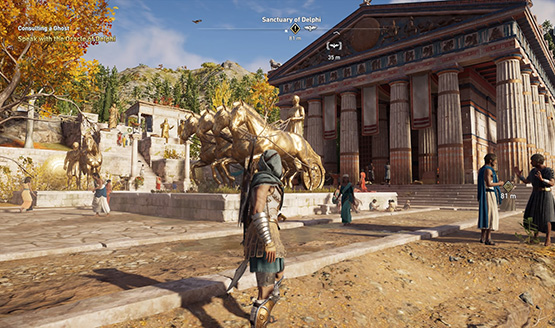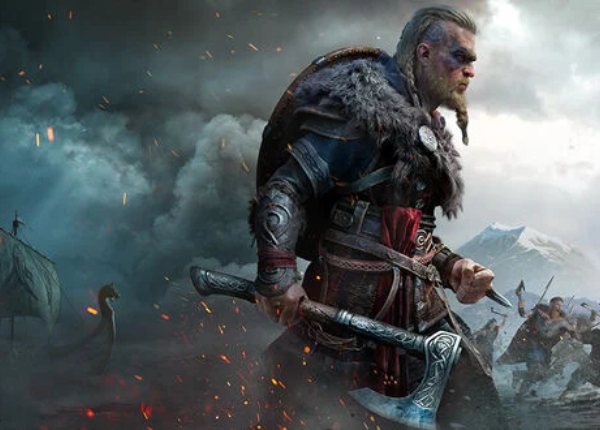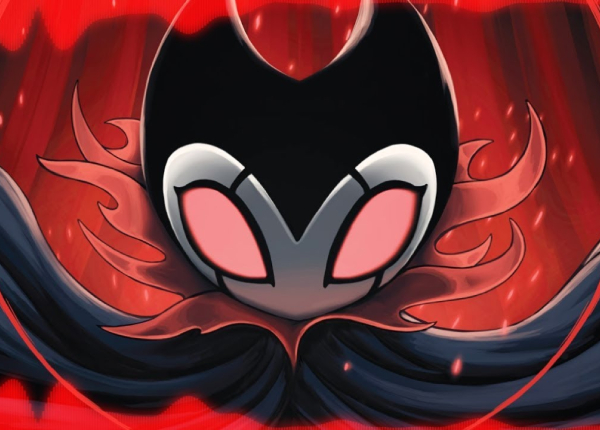Assassin’s Creed Odyssey review – Polygon

When the Assassin’s Creed team decided to call this game Odyssey, they weren’t fooling around. Like Homer’s tale of Odysseus, it’s an Ancient Greek romp across adventure-strewn islands, sailing wine-dark seas on a journey home. And like The Odyssey, it’s long; really long.
The word ‘odyssey’ also implies an expedition into self, a search not merely of secret islands, but of internal truths. This too is true of the latest Assassin’s Creed, which presents us with a complex lead character, an authentic portrayal of a multifaceted person struggling with the agony of parental rejection, while living a life layered upon, rather than dedicated to, their own tragedy.
I think ‘odyssey’ also refers to the meta-journey taken by Ubisoft, since the first Assassin’s Creed launched more than a decade ago. In this new game, the series has completed its twisty-turny trek from stealthy action adventure to fully-grown role-playing game. Assassin’s Creed Odyssey is a deep, playful fantasy, in which we give ourselves over to another world.
THERE WILL BE KILLING
For the first time in the series, I can play the entirety of the game either as a man (Alexios) or as a woman (Kassandra). I chose the latter. We find Kassandra — youthful, ambitious, vigorous, frustrated — living on a remote island, helping her disreputable guardian as he embarks on yet another get-rich-quick scheme.
He is kind and warm, having raised her since childhood abandonment, but his recklessness leads her into conflict with the local loan shark, a problem she deals with by kicking ass. She soon saves the life of a ship’s captain who offers her a free ride. So begins her journey, as she searches for her real parents. Her memories suggest a traumatic separation, and many unanswered questions.
Kassandra (and, I assume, Alexios too) differs from the usual Assassin’s Creed lead character, by way of her convincing humanity. Her stoicism in the face of grievous injustice isn’t so much a lazy a priori tough guy characteristic, but a hard-earned reaction to her upbringing.
She knows how to fight, but she’s also open to the joy of the world, to the warmth of friendships, to laughter and to jokes. Her humor is light and laconic, as might be expected from the daughter of the famously ironic Spartans. She’s often very funny.
The game’s developers at Ubisoft Quebec have created a person who is physically plausible, in terms of her body language, but most especially her eyes, which are more lifelike than any I’ve seen in a game before. The writers also deserve credit for ranging far from the video game heroic standard, creating someone with potent flaws, including naiveté, anger and social awkwardness. Kassandra is a genuinely likable human being.
ENTANGLED IN A SNARE
Which brings us to her profession, of killing people. Odyssey is set in the midst of the Peloponnesian War, in which Sparta and Athens fought murderously for control of the Greek world.
Athens may have been the “cradle of democracy,” but it ran a straight-up protection racket over its naval empire. Sparta was, essentially, a militaristic proto-fascist slave-state, lording it over nearby cities. As Odyssey unfolds, both make the case for Kassandra’s alliance, but neither is allowed to fully engage her sympathies.
She lives in a moral and political no-man’s land, playing both sides for her own ends. When she turns up on an island dominated by Athens, she helps the locals by killing the invaders, thus serving the interests of the Spartans. But when Sparta is treading a polis underfoot, she has no problem switching sides.
This lack of constancy can be explained away as her desire to deal with injustice at a local level. But you could just as easily argue that she’s prolonging the war, and profiting from doing so.
Her disregard for her own role in the war is never really addressed. I found it best to consider her as someone who helps people in need as she finds them; a hired gun who kills the agents of a needless, dreadful war. In time, a malevolent secret society is uncovered, which delivers a handy locus of evil that the morally ambiguous combatants otherwise fail to provide.
:no_upscale()/cdn.vox-cdn.com/uploads/chorus_asset/file/13186143/ss_3f8f4a09fb1d69648a8c20aae19ca2924ba275bd.jpg)
YOUR SWORD IN ITS SHEATH
As in all Assassin’s Creed games, stealth and murder are core activities. It’s up to me how far I lean in towards one or the other.
When Kassandra is presented with a military outpost, she is often given orders to kill senior officers and politicians. But she’s also tasked with stealing some item of note, or releasing a prisoner. For those who take pleasure in outfoxing enemies, rather than slaying them, this can be done (with the right amount of skill and care) without alerting the guards, or by knocking them unconscious.
I find stealthing to be a lot more fun than fighting, but the guard AIs are alert, and their positioning is often challenging to even the best stealth players. If ever I’m discovered, I put Kassandra’s considerable combat skills into action.
Her basic melee abilities make use of quick daggers and swords, or heavy, slower clubs and axes, or long spears that keep enemies at bay. She also carries a bow for range attacks.
Finally, she has access to special moves that are earned through leveling. There are four for melee and four for range. Some of them are extremely useful; adding health during a fight, or a strong Spartan kick, for example. These can be swapped out and changed, and it’s really a matter of personal preference rather than achieving ever more powerful moves.
Taking down military infrastructure affects the wider world. As (say) Athenian military power ebbs in the local area, Spartans move in to wage war. This triggers a battle sequence in which Kassandra takes sides, and tries to kill enough senior officers to tip the battle. These are great fun, highly challenging and good ways to rack up XP (more on XP later.)
Other quests include killing troublesome wild animals and bandits, or assassinating nasty people. She investigates places of interest for clues, solves physical puzzles and raids tombs as well as underwater shipwrecks.
She’s also a ship’s captain who sails a ramming trireme, taking on pirates in great battles, enhanced by prettily rendered seas that heave and rage.
:no_upscale()/cdn.vox-cdn.com/uploads/chorus_asset/file/13186151/ss_458b7cc7392b6fd073bbd679868fd486013cb474.jpg)
BY HOOK OR BY CROOK
These activities are broadly in line with last year’s Egyptian adventure, Assassin’s Creed Origins, and it’s tempting to see this game as merely a slightly bigger rewrite. Yet, there are differences that are worth mentioning.
The annoying set-piece quasi-QTEs are gone, replaced with more organic and free-flowing challenges. Intrusive road patrols no longer break up every journey. Time spent hunting highly specific animals is less central.
Odyssey also allows players to explore the world using on-screen clues, rather than more direct guiding icons. This more subtle way of engaging in the world can be switched on and off at will, but if you’re ready to really explore, rather than cruising like a bus tourist, it’s worth the extra challenge.
Kassandra engages in conversation options, most of which come down to the easy choice of “be nice or be an asshole.” But there are also more meaningful conversations than we’ve seen in the past, and harder choices that affect the storyline.
I’ve come across a couple of instances when decisions I made hours before come back to haunt me. This makes the world feel more like a human construct. There are, of course, a limited number of endings, but I enjoy the ability to make well-meaning mistakes, and feel awful about their consequences
Still, some faults remain. Narrative linearity is easily broken. In one example, I engage romantically with a character immediately after making her very angry, while also completing a mission crucial to her, which I was unable to tell her about.
In another example, Kassandra clears a barracks of all enemies, but when she returns, she’s worried about the alertness of the guards, all of whom she just got done murdering. It’s confusing.
The auto-travel thing — where you point your horse in the right direction, and off it goes — still doesn’t work as it should, and I’m tempted to say it may even be worse than last year. I also dislike the way the main character is forever bumping into people, like the rudest person in the world.
Also, many of the quest-givers seem to have similar faces. One woman shows up as a major quest-giver (and potential romantic partner) early on. Later, faces much like hers reappear again and again on different people.
There are still bugs, such as animals floating in mid-air, though they are rare. I also crashed a couple of times. Loading screens felt long, though this may be something that’s fixed by launch day.
Also (and I complain about this every year), the whole modern Animus sub-plot is the stupidest thing about Assassin’s Creed. I feel like the historical fiction stands well enough on its own, without the addition of burdensome sci-fi claptrap. Thankfully, this pointless, artless storyline takes up a tiny part of Odyssey.
:no_upscale()/cdn.vox-cdn.com/uploads/chorus_asset/file/13186157/ss_71f5c2052a6bfb94486e929db3d6b92c06696843.jpg)
SO ROARED THE GOODLY DOOR
As Kassandra goes about her story, she must level up by completing quests. Level differentiation is hugely important in Odyssey. Although the game is pitched as an open world — and I can choose which current quests to take in which order — this only works in parts of the world appropriate to my level.
Other parts of the world are deemed appropriate only for higher levels. Effectively, this walls them off for anything but the most cursory expedition. While I might be able to subdue an entire fort at my level, I can barely handle an outraged pig that is two levels above me.
So the story is kept within the broadly manageable bounds of linearity. Although each player explores particular islands and cities in their own ways, we all travel through this narrative in much the same order, following a strict geographic ordering. I don’t mind this, but it certainly isn’t an “open world.”
In last year’s Origins, players were able to complete the story (in about 50 hours) and then go off and explore the rest of the Egyptian world, entering higher levels as they went. In Odyssey, the story is stretched out over much more of the game, meaning plenty of XP grinding.
Early in the game, grinding by racking up small quests, only occurs in patches, with the central story offering almost enough XP to keep up with leveling demands. But it certainly becomes more common later in the game, in which the final act is stretched over a vast hinterland of leveling.
I’m also discomforted by microtransactions that allow players to spend real cash boosting their XP in order to complete the story, without grinding. This seems to fly in the face of a design decision based on the developers’ desire to share the whole world, and all its wonders, with the player.
THE CREATION OF GENIUS
And yes, this is a game worth sharing. Its geography is a beautiful montage of sunbaked islands, war-ravaged towns and towering ancient cities. From the brand-spanking new Parthenon to the tiniest butterfly, Odyssey provides a place of intense visual pleasure.
Respect has been paid to the historical Greece at this time, to its politics, culture, mythology, sexual norms, architecture, religion, humor, philosophy, art and morality.
Most of all, the people in this game are engaging and amusing. I loved hanging out at a symposium, debating philosophy with Socrates and flirting with Alcibiades. I loved making friends with my absurdly religious ship’s captain, with a no-nonsense pirate, with a devoted child.
This is why, for all its faults, Assassin’s Creed Odyssey is one of the best explorable game worlds yet made. It’s ambitious enough to recreate ancient Greece as a detailed panorama, and to populate it with lovable, faulty, funny human beings. Like great historical fiction, it feels like journey into a thrilling, alien and dangerous adventure.
Assassin’s Creed Origins was reviewed using a final “retail” PlayStation 4 download code provided by Ubisoft. You can find additional information about Polygon’s ethics policy here.
[ad_2]
Source link





